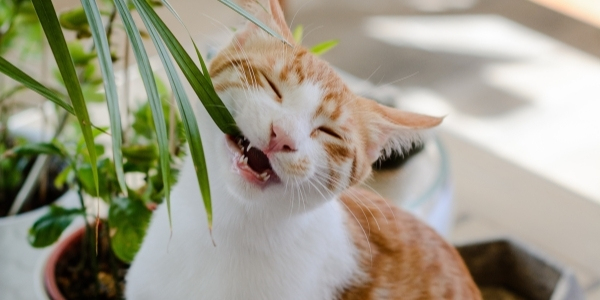Many of us have experienced the frustration of our beloved houseplants being nibbled on by our pets. Cats and dogs, in particular, can be notorious for their curiosity and tendency to chew on plants. While non-toxic plants can help pets cleanse their stomachs, the consequences can be dire if they mistakenly consume toxic plants. It is crucial to ensure that your houseplants are safe for your pets to avoid any potential harm.
Here is a list of popular non-toxic plants that pose no harm to your pets. However, whether your pets will cause harm to the plants themselves is another matter.
Palms: Palms, which are non-toxic to pets, not only purify the indoor air but also add a touch of vibrant green to your living space, creating a more welcoming environment for your pets. Palms can provide shade and shelter for pets. The Parlor Palm is considered a safe plant choice. Another pet-friendly option is the Hovea Forest Liana, which adds a tropical flair to your interior. However, it’s important to be cautious with the Sago Coconut plant, as it can cause liver damage if ingested by cats and dogs.
Orchids: With their sculptural appearance and delicate colors, orchids can enhance the beauty of any indoor space. Fortunately, they are completely harmless to your pets. Just take care to protect the delicate petals from being destroyed by curious pets.
Spider Plant: Spider plants are a popular choice among pet owners as their harmless leaves are often enticing to cats and dogs. However, consuming excessive amounts can lead to illness, so it’s best to hang the plant on a high shelf where it is out of reach.
Ferns: With their gracefully unfurled leaves, ferns add an exquisite and elegant touch to interior décor. Three beloved fern varieties that are safe for pets are Adiantum, Boston Fern, and New Pteris Fern.
Succulents: Succulents come in a variety of grayish hues, making them perfect for adorning desks or tabletops. Their thick, juicy leaves pose no harm to curious pets.
While some plants are non-poisonous, there are certain precautions to consider when purchasing plants:
- Ensure that the plants are free from pests and diseases.
- Place all pet-friendly plants in areas with partial sunlight and shade, avoiding direct sunlight.
- Use suitable nutrients for edible plants sparingly, about once a month, to maintain their health.
If your pet exhibits any adverse reactions after consuming a plant, it is crucial to seek veterinary attention immediately. Safety should always be the top priority to ensure a harmonious coexistence between pets and plants.
